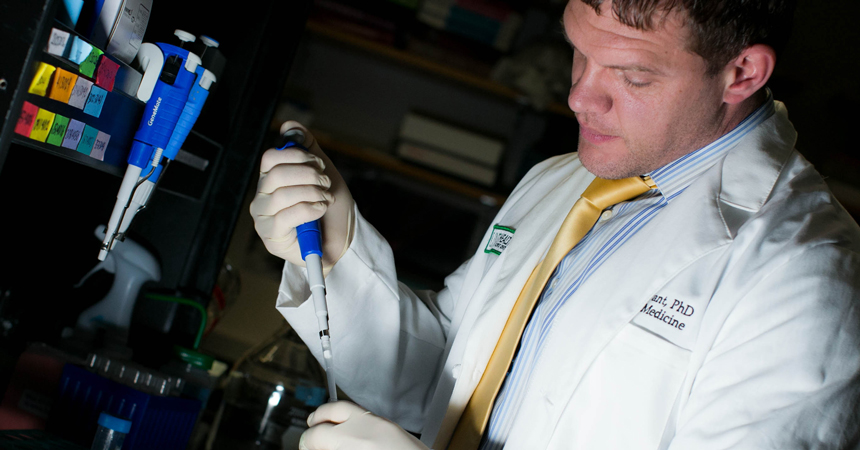A blood test that IDs Alzheimer’s earlier, easier and cheaper
By Jan Jarvis

The first study of a blood test to detect Alzheimer’s disease within a primary care setting soon will be conducted at UNT Health Science Center.
The simple test could be a game-changer in the diagnosis of early Alzheimer’s. If successful, it would be possible to identify patients earlier, easier and at a lower cost than any method that exists today, said Sid O’Bryant, PhD, Professor of Pharmacology and Neuroscience. The test could be conducted at your family doctor’s office.
Interested in learning how to be a study participant?Call 817-735-2963 for more information. |
“Using this simple blood test, primary care doctors will be able to tell if someone has early Alzheimer’s,” he said. “Nobody anywhere on the globe has a test that can do that now.”
The three-year study, funded by a $6.5 million grant from the National Institute on Aging, will look at accuracy and effectiveness of the test in screening older adults.
Between 500 and 600 adults ages 65 and older who are experiencing memory issues are needed for the study, which requires a physician referral. The test looks for biomarker proteins in the blood to detect Alzheimer’s disease. In previous studies, it was shown to be 96 percent accurate.
Currently when someone has memory loss and other symptoms of Alzheimer’s, they must undergo expensive testing that includes an MRI and sometimes a PET scan to detect plaque in the brain that forms when proteins called beta-amyloid clump together. A lumbar puncture can be done as well. The brief cognitive exams used in primary care doctor’s offices take time and are not very accurate, Dr. O’Bryant said.
The blood test would not only reduce the cost of testing, but also make it possible to treat patients earlier. Although there is no cure for Alzheimer’s, drugs are available that slow the decline in memory and minimize the effect of the disease.
More than 5 million Americans have Alzheimer’s disease, with a substantial increase expected in the decades to come. The disease affects an estimated 12 percent to 15 percent of seniors. For the vast majority of older adults, this test could put their mind at ease, Dr. O’Bryant said.
“This test means their physician can tell their patients, ‘Stop worrying,’” he said. “There’s no need for a referral for expensive tests or any reason to take costly medications.”
As part of this study, all participants will undergo an MRI and PET scan in addition to the blood test and testing of memory and thinking. The study is expected to begin this fall.
Dr. O’Bryant, who has spent the last 20 years developing a way to screen for Alzheimer’s disease in primary care, said he is optimistic that the blood test will be available within 10 years and have a significant impact on generations to come.
“That has been my goal for a very long time,” he said. “If we can get it into the hands of physicians in five to seven years, I’ll be thrilled.”
This research is supported by the National Institute on Aging in the Institutes of Health. The content is solely the responsibility of the authors and does not necessarily represent the official views of the NIH.






Social media